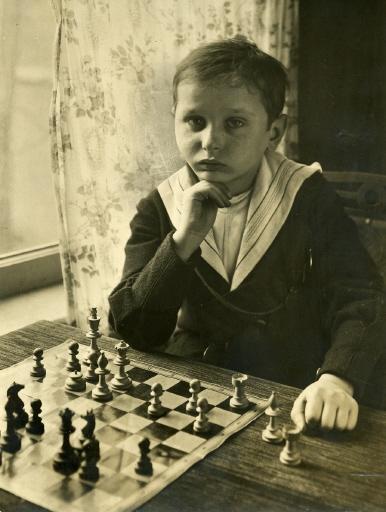
Edward Winter

Samuel Reshevsky in the Netherlands, February or March 1920 (Photograph courtesy of Michael Clapham (Ipswich, England) in C.N. 4791.)
‘To achieve world-wide fame at the age of eight is a mixed blessing. Such was my lot in life. I was a “chess prodigy” and my childhood, from the time I left my native Poland in 1920, consisted of a series of public exhibitions throughout Europe and the United States. Wherever I went, great crowds turned out to see me play. For four years, I was on public view. People stared at me, poked at me, tried to hug me, asked me questions. Professors measured my cranium and psycho-analyzed me. Reporters interviewed me and wrote fanciful stories about my future. Photographers were forever aiming their cameras at me.’
Source: Page 1 of Reshevsky on Chess by Samuel Reshevsky (New York, 1948).
On page 10 of the August 1992 Chess Life Andy Soltis wrote that Reshevsky had told a number of chessplayers that he was born in 1909, and not 1911 as commonly believed. If so, a curious (and unflattering) twist is given to the series of intelligence tests that the prodigy underwent in Berlin in 1920 at the hands of Dr Franziska Baumgarten. The latter wrote a detailed report in CHESS (14 March 1939, pages 245-246). Pages 323-324 of the 14 May 1939 issue of the same magazine reproduced the memory and geometrical tests. Dr Baumgarten, whose subject may have been over ten years old and not eight-and-a-half, reported:
‘He failed to recognise a lion, a monkey, a tiger or a camel; a fox or wolf he called a dog; a bat he called a bird .... Shown a picture of a mushroom, he said “chocolate!” – presumably on account of the colour; to a picture of a cabbage he said “tree”. He had never, so far, tried to draw, and was unable to copy even the simplest geometrical forms correctly. Moreover, though he knew that the day was a Wednesday, he had not the slightest idea of the day, month or day of the month. He did not know the names for the elementary colours red, yellow, blue. In Arithmetic, he was below standard for his age: he did not know the number 0 ...’
Unfortunately, the report omits to indicate whether Reshevsky’s mother tongue was being used. In tests on spatial visualization the boy fared much better.
‘It was in memory tests that the young Reshevsky showed the most extraordinary proficiency. He was allowed four minutes to examine 40 figures, each drawn in a special square on a sheet of paper; the paper was then removed. He was able to restate the figures without a single mistake, and in the correct order.’
Dr Baumgarten also noted that the boy was exceptional in that he declined any assistance with the tests; ‘this desire to overcome difficulties is definitely characteristic of unusually gifted children.’
(1943)
C.N. 11994 invited readers to imagine themselves as the editor of a chess quotations anthology faced with handling a remark attributed, in various wordings, to both Tarrasch and Tartakower. Now, let readers see themselves as the editor of a single-volume chess encyclopaedia and having to decide what date of birth to give in the entry on Samuel Reshevsky.
The natural course may be to follow Jeremy Gaige’s Chess Personalia (Jefferson, 1987) and take the precaution of also checking the privately circulated 1994 edition:


‘26 November 1911’ is in both editions, but the encyclopaedist may worryingly recall an article by Andrew Soltis on pages 10-11 of the August 1992 Chess Life:

From C.N. 1943:
On page 10 of the August 1992 Chess Life Andy Soltis wrote that Reshevsky had told a number of chessplayers that he was born in 1909, and not 1911 as commonly believed.
Page 202 of Kings, Commoners and Knaves added a footnote:
However, in an interview with Hanon Russell in August 1991, Reshevsky insisted that he had indeed been born in 1911.
C.N. 11199 reverted to the subject:
... a claim emerged in the early 1990s that Samuel Reshevsky was born in 1909 and not, as commonly accepted, in 1911.
The matter is discussed by Bruce Monson in an article about Reshevsky on pages 46-55 of the 1/2019 New in Chess.
Here, we quote the start of Monson’s investigation of the birth-date matter (page 51):
‘But in the 1990s other information started percolating to the surface, no doubt in the wake of Sammy’s death on 4 April 1992. In the August 1992 Chess Life Andy Soltis revealed that Reshevsky had told a number of chessplayers that he was actually born in 1909 and not in 1911. Unfortunately, Soltis did not identify these individuals. However, it is plausible. Reshevsky was known on occasion to inadvertently spill the beans about other “secrets” from his past, such as the assertion that he had never studied chess as a child, which is simply not true, only to later try to shove the genie back in the bottle.’
Difficult to summarize, Monson’s article is important and should be read in full. It contains both documentation and speculation, marked as such. One image is a Łódź registration card dated 1919 which indicates that Samuel Reshevsky was born in 1909 (with no exact date). Using this and other materials and inferences, Monson wrote on page 53 of the New in Chess article:
‘Conclusion: Reshevsky’s birthday should – at the bare minimum – be adjusted to 26 November 1909. And in all probability his actual date of birth was 26 May 1909, adding an additional six months to his age.’
What, then, should our hypothetical encyclopaedist put in the Reshevsky entry?
Andrew Soltis has a new book out, a chess memoir entitled Deadline Grandmaster (Jefferson, 2024). Page 246, which can be viewed online, includes the following:

Some obvious questions:
1. ‘In Chess Life I wrote that Samuel Reshevsky was born two years before he claimed.’ Where in Chess Life? Certainly not on page 10 of the August 1992 issue, where, as shown above, Soltis mentioned the 1909 date merely as a possibility derived from hearsay.
2. ‘I was accused of falsely maligning Reshevsky.’ By whom, where and when?
3. ‘His birth record surfaced more than a decade later and confirmed I was right.’ Where and when? And more than a decade later than what?
4. The Deadline Grandmaster text shown above ends with a superscript 7. This leads to the ‘Chapter Notes’, where, on page 356, note 7 reads (in full):
‘New in Chess, Issue 1, 1999.’
Why put that? Issue 1, 1999 of New in Chess has nothing about Reshevsky’s date of birth.
(12035)
Addition on 2 October 2024:
From Marek Soszynski (Birmingham, England):
‘I believe I was the first to discover and publish evidence that Reshevsky was born in 1909, which I presented in my book The Great Reshevsky: Chess Prodigy and Old Warrior (Forward Chess, 2018). Bruce Monson briefly references my findings in his article, and explained to me at the time that the brevity was due to editorial cuts by New in Chess. My later book, Rare and Ruthless Reshevsky (MarekMedia, 2023), does not revisit the birthdate issue.’
From page 203 of Kings, Commoners and Knaves:
We have copies of the earlier German language versions of the Reshevsky report, as follows:
– pages 235-244 of the journal Praktische Psychologie, 8/1920;
– pages 46-59 of the book Wunderkinder Psychologische Untersuchungen by Dr Franziska Baumgarten (Leipzig, 1930).
They indicate that the tests were not conducted in Reshevsky’s mother tongue.
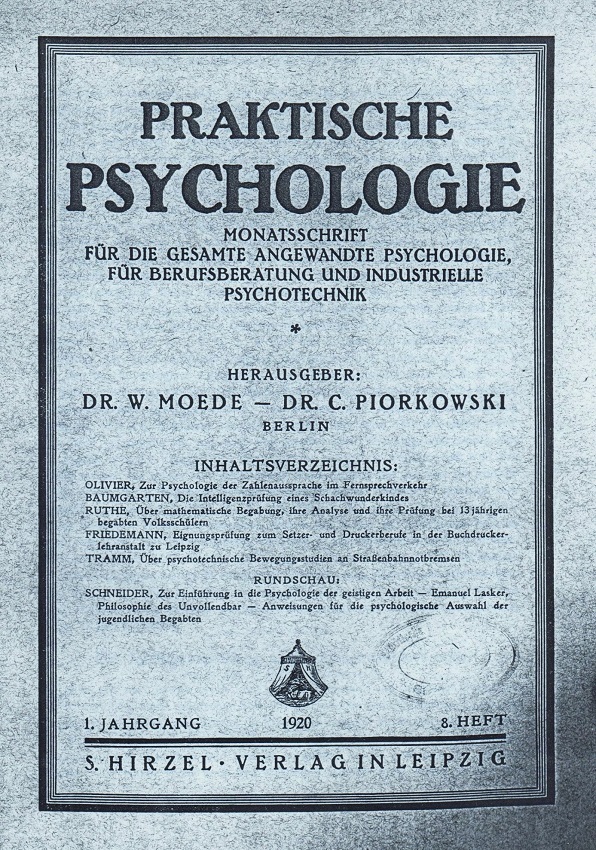
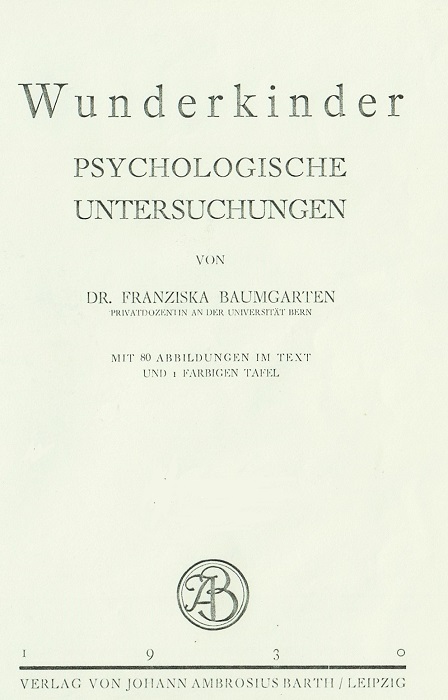
The opening page of the article on Reshevsky in the latter publication (page 46):
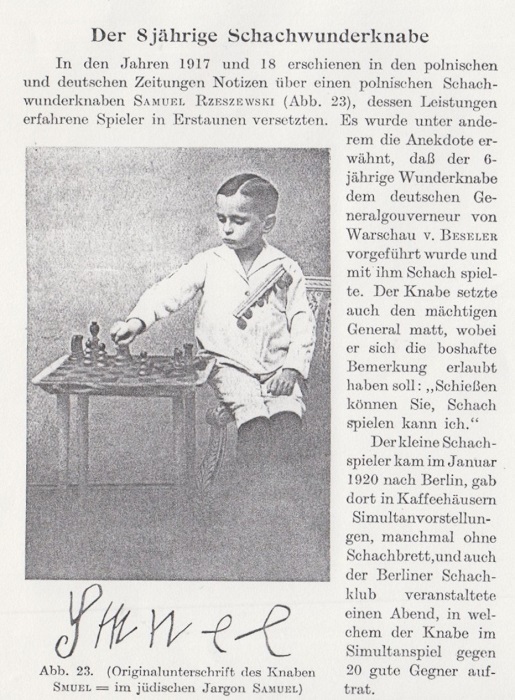
The above-mentioned introductory article by Franziska Baumgarten:
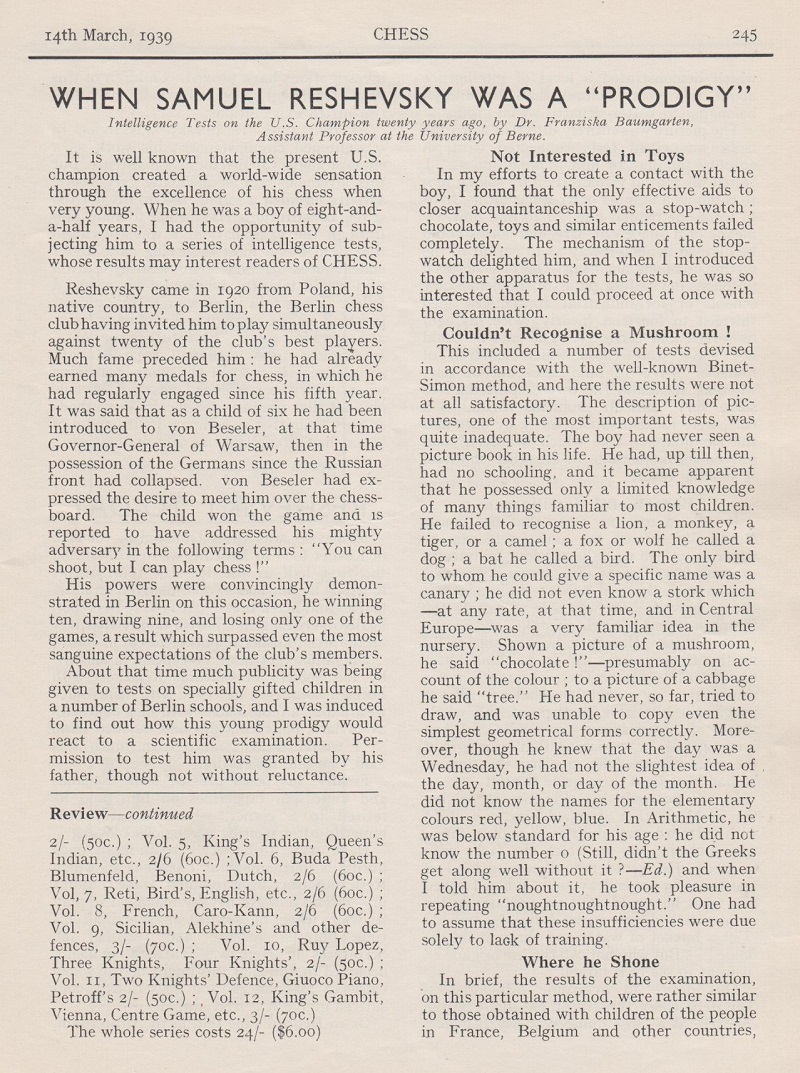
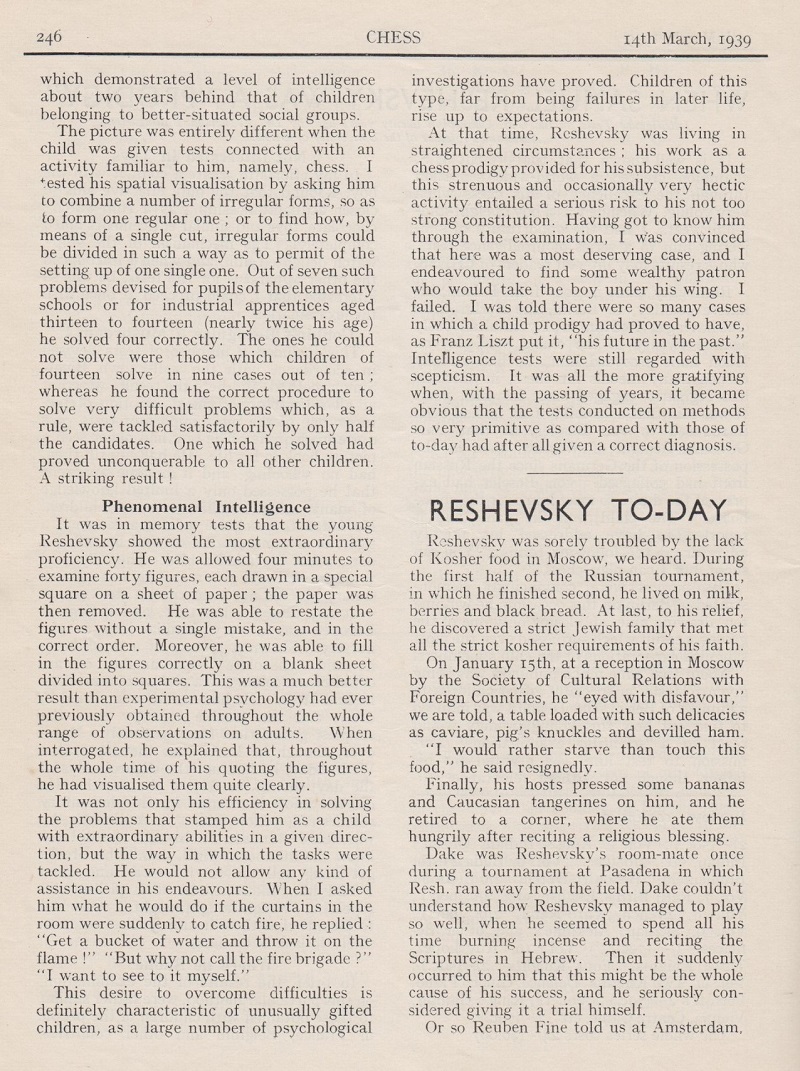
The tests as published by CHESS two months later:
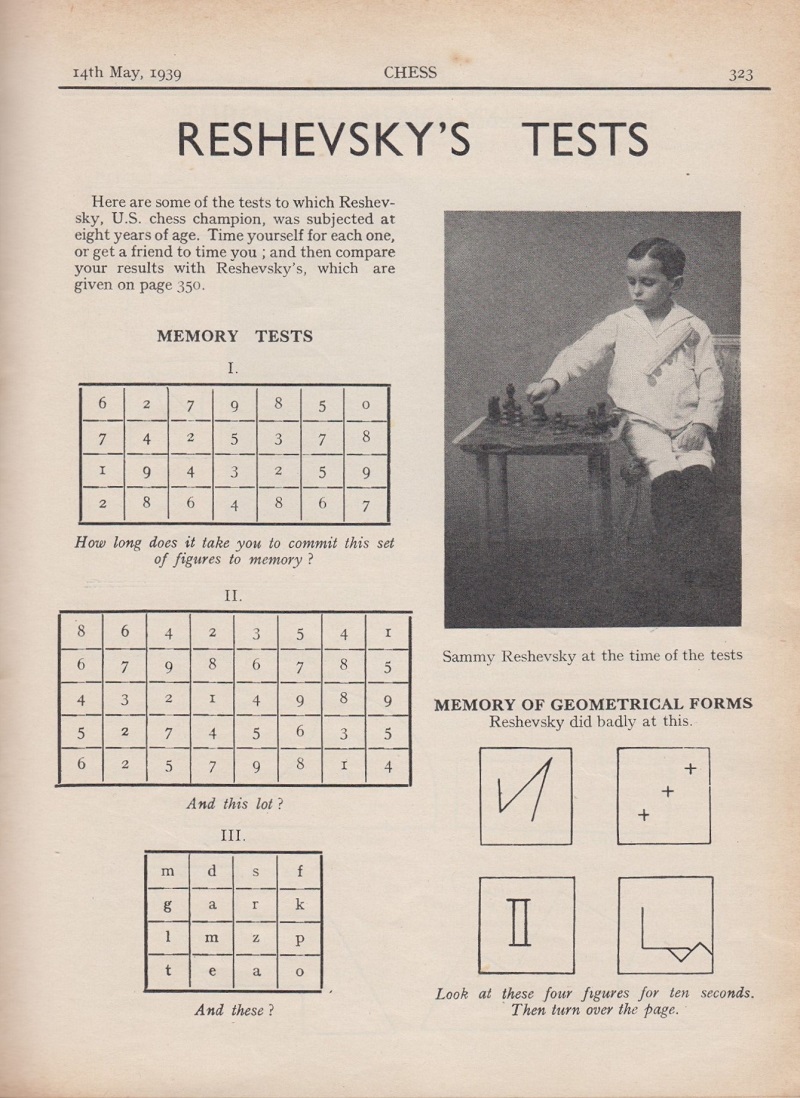
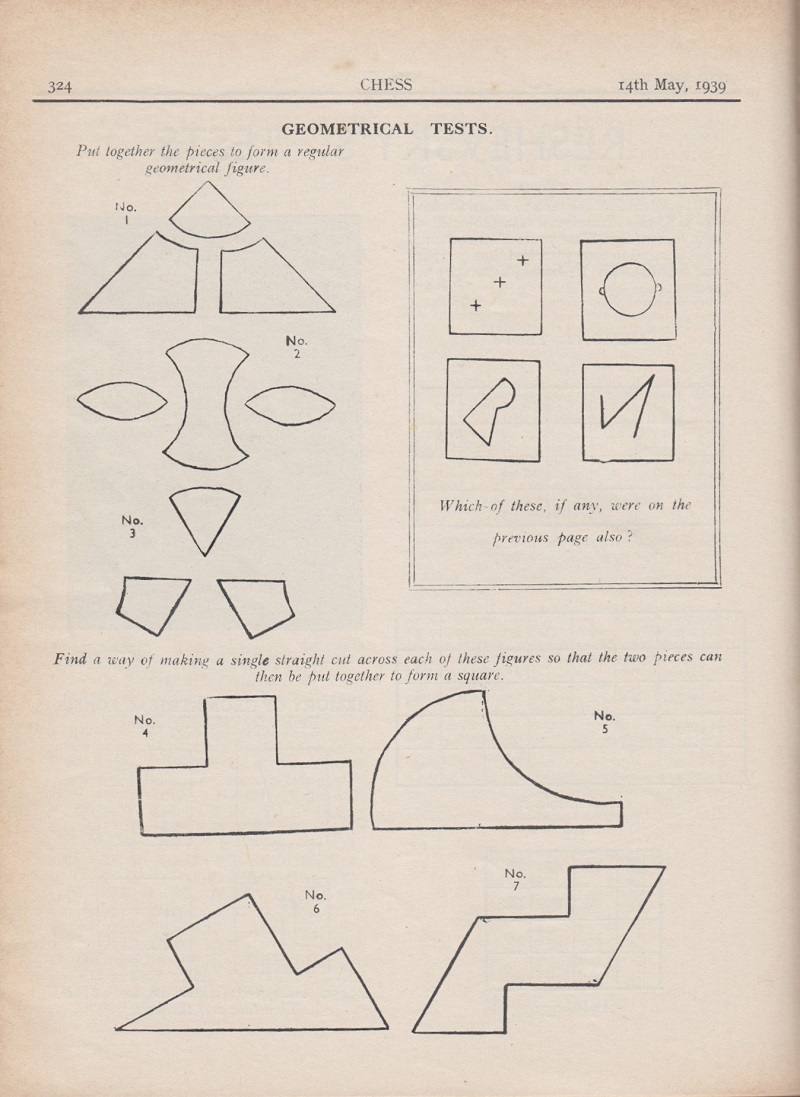
The solutions published later in the same issue of CHESS are at the end of the present article. Some discussion of the tests given to Reshevsky appeared on pages 26-27 of The Psychology of Chess by W.R. Hartston and P.C. Wason (London, 1983).
The following article comes from pages 210-211 of the November-December 1969 Schweizerische Schachzeitung:
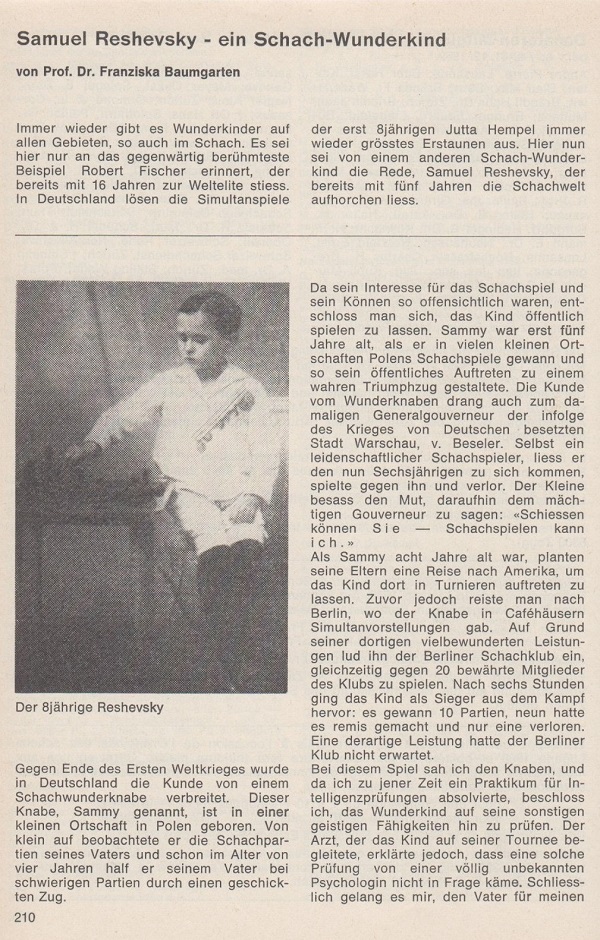
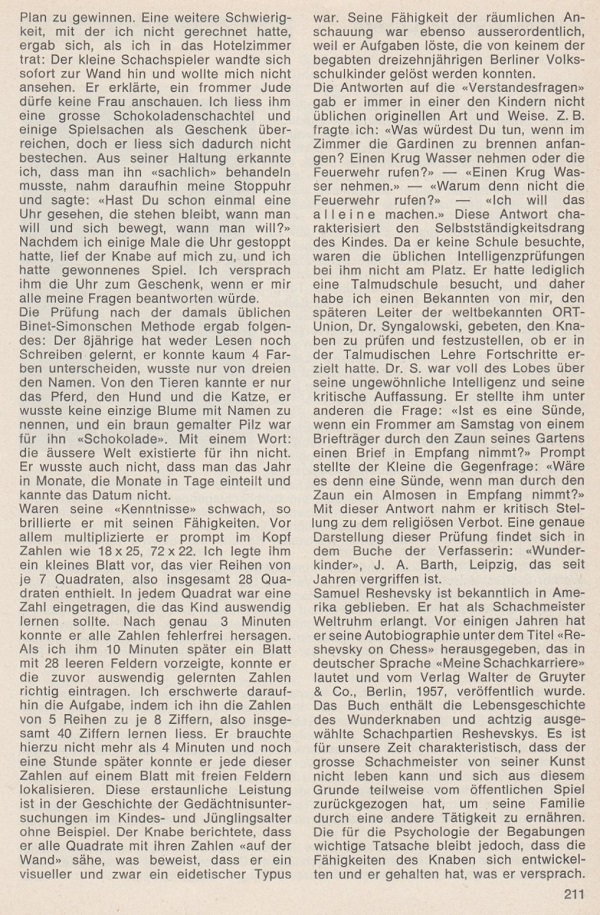
Finally, the solutions to the tests, from page 350 of CHESS, 14 May 1939:
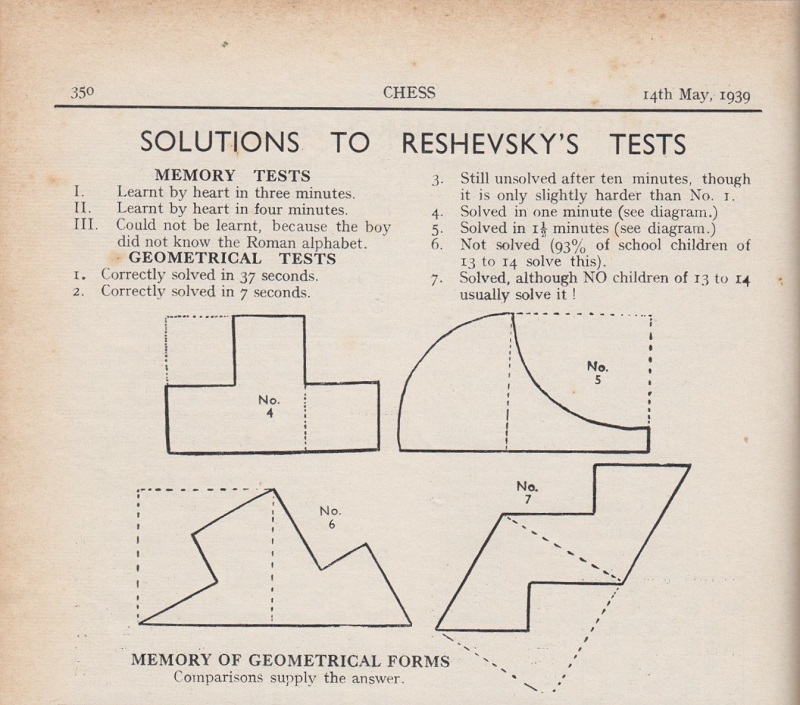
Related articles:
To the Chess Notes main page.
To the Archives for other feature articles.
Copyright: Edward Winter. All rights reserved.